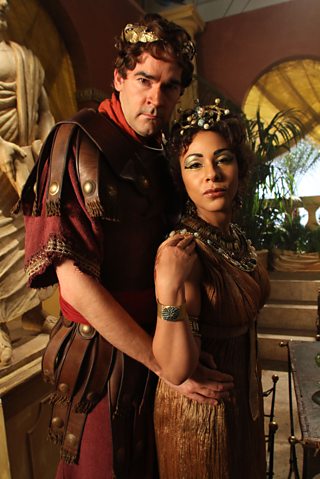Everything you didn’t know about Cleopatra
History genius Greg Jenner is known for making the past fun and exciting on the TV show Horrible Histories and the podcast You’re Dead To Me. And now he’s making historical events fun, exciting AND educational on the Â鶹ԼÅÄschool History podcast. It’s full of facts which remain in your brain. This week he’s investigating that famous Queen of Egypt, Cleopatra.
She wasn’t Egyptian

After the stuff about hiding in carpets, bathing in milk and being bitten by snakes (more on some of that later), the most famous thing associated with Cleopatra, who was born around 69 BCE, is Egypt. But in fact she was descended from Greeks and spoke Greek. Her dad was called Ptolemy and his ancestor was one of Alexandra the Great’s generals. Even her name is Greek. It translates as “great like her father”.
She married her brother
If, like me, you don’t really enjoy having to type out the word Ptolemy as your computer keeps trying to change it to “Potato” then you’re in for a bad time as there are many Ptolemys ahead. The first one was Cleopatra’s little brother Ptolemy XIII. After Cleo’s dad died, she was put in charge, but at the time women weren’t allowed to rule without a male co-ruler, so the easiest solution appeared to be Cleo marrying her little brother and reigning Egypt together. Which, let’s face it, is odd.
She battled her brother
If any of you have younger siblings, then you know that occasionally quarrels erupt. Well, this is certainly what happened with Cleopatra and brother/husband Ptolemy, as when he turned 13 in 49 BCE he quite fancied ruling without his sister/wife. He conspired against her, so Cleo fled to Syria, raised an enemy and soon Egypt had descended into civil war. Meanwhile, Rome was also engaged in a civil war as Julius Caesar battled his rival, Pompey. Pompey, struggling to beat Caesar, fled to Egypt for help. But Ptolemy, trying to impress Caesar, had him swiftly killed. But this, in fact, enraged Caesar who set off for Egypt himself.
She was a great persuader
Caesar demanded an explanation from Ptolemy, and Cleopatra and ordered them both to appear before him. This was tricky for Cleo as she was currently having a bit of a war with her brother and couldn’t just pop into the palace. Instead she sneaked in, wrapped in a duvet or bed roll (not a carpet) according to the historian Plutarch, and saw Caesar alone. Not only was Julius impressed by her ability to hide in bedding, but he also appreciated her various other attributes and the two of them soon became a power couple. Ptolemy was so angry he reportedly threw his crown to the floor. And then ran away.
She was brave
Ptolemy, the perfect embodiment of a stroppy Egyptian teenager, dashed off and raised an army, laying siege to the city of Alexandria which Cleopatra and Caesar were in. He even pumped raw sewage into the drinking water to try and get those trapped inside the city to give up. But then Roman reinforcements arrived and Ptolemy was defeated at the Battle of the Nile, supposedly drowning when his golden armour was too heavy to swim in.

Who was the real Cleopatra?
A clip from Â鶹ԼÅÄschool History.
She was a popular leader
She decided she was the living embodiment of the goddess Isis and dressed accordingly on occasion.
Now Cleo was free to rule again. But she still needed a male co-ruler so she, surprise, married another brother who was called, surprise surprise, Ptolemy. This one was Ptolemy XIV. But thanks to her alliance with Caesar and Rome, Cleopatra’s position was more secure and she cemented her popularity by speaking and dressing like an Egyptian while on official duties, while reverting to Greek in private. She also decided she was the living embodiment of the goddess Isis and dressed accordingly on occasion.
She was ruthless
The alliance with Caesar was further cemented by Cleo having a child whom she called Caesarion (or little Caesar), suggesting who the dad might be. Unfortunately, this alliance hit a bit of a snag when Caesar was assassinated in 44BCE. Even more awkwardly, Cleo was in Rome visiting him at the time. She quickly dashed back to Egypt and soon realised that her son could now be her co-ruler and so had poor little Ptolemy XIV poisoned.
She wasn’t always right

Cleo poisoned herself, though probably not via a venomous snake.
With Caesar gone, Rome was being ruled by three men including Mark Antony and Octavian. Mark Antony was married to Octavian’s sister which makes the next bit even more awkward. Antony attempted to maintain Rome’s alliance with Egypt by bombarding Cleo with letters and eventually turning up on her doorstep. Inevitably, the two of them also became a power couple, eventually having three children together. Cleo also funded Mark Antony’s habit of trying, and failing, to invade other countries. But this alignment with Antony would prove to be her undoing.
She was dangerous to have as a sister
It wasn’t just brothers that Cleopatra had it in for. She also feared her sister Arsinoe was plotting against her and convinced Mark Antony to have her killed, even though she was hiding inside a temple. Romans were outraged that she was killed on sacred ground. Then Mark Antony successfully (for once) invaded Armenia and declared that one day his children would rule it. Again, Rome wasn’t delighted that Antony was handing over chunks of the empire to his kids and the senate declared both him and Cleopatra to be enemies of Rome.
She left a legacy
Octavian had decided he’d had enough and met with Antony’s forces at the Battle of Actium in 33BCE. Antony’s army was defeated. He fled to Alexandria and, knowing capture was imminent, stabbed himself and died in Cleo’s arms. Cleo then poisoned herself, though probably not via a venomous snake. So her rule of Egypt was over, but her legacy lived on. Her three children were taken to Rome and raised by Mark Antony’s widow. One of her daughters. Cleopatra Selene, later became a queen herself, and so kept the family business going.
More from Radio 4
-
![]()
Â鶹ԼÅÄschool History: Cleopatra
Join Greg Jenner for a fun homeschool history lesson on the life of Queen Cleopatra.
-
![]()
Who was the real Pocahontas?
Greg Jenner tells the true story of the Native American princess.
-
![]()
Everything you never knew about Roman Gladiators
Do you know your murmillos from your hoplomachus?
-
![]()
In Our Time: Cleopatra
Melvyn Bragg and his guests discuss Cleopatra.















